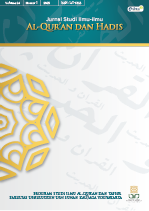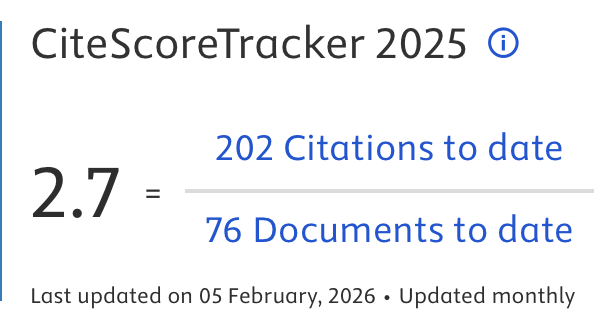Politics and Pluralism: Analyzing State Official Tafsir and Interfaith Discourse in Indonesia
DOI:
https://doi.org/10.14421/qh.v25i1.5379Keywords:
Tafsir, Institusional Tafsir, Politization of Religious, Interraligious RelationAbstract
This research aims to explore the Tafsir produced by the Ministry of Religious Affairs of the Republic of Indonesia, specifically focusing on the potential politicization of the Qur’an, particularly in the narrative of inter-religious relationships in Indonesia. The study underscores the crucial role of Tafsir in shaping societal perceptions of religious pluralism in the country. In this context, a significant question arises concerning the extent to which the interpretations generated through the state's political mechanisms contribute to the discourse on religious pluralism. To address this inquiry, the critical discourse analysis approach by Norman Fairclough is employed, encompassing three dimensions: text analysis, discursive practices, and social practices. The analysis focuses on the Tafsir produced in 1980 by the Indonesian Ministry of Religious Affairs titled "Al-Qur’an dan Tafsirnya." The research reveals that the narrative regarding inter-religious relationships in Indonesia within the official Tafsir is not solely connected to the state's role through the Ministry of Religious Affairs of Indonesia. It is also influenced by various factors such as the socio-religious context and the role of Mufassir (mufasir). This situation is reflected through three patterns of state affirmation: Affirmative-Accommodative, Affirmative-Permissive, and Affirmative-Disruptive. The substantial contribution of this research lies in enhancing the understanding of the intricate relationship between religious exegesis, state politics, and radicalism in Indonesia. This opens avenues for further reflection and debate in scholarly literature, particularly regarding the impact of state involvement in the Qur’an interpretation process on the narrative of inter-religious relationships in Indonesia.
References
Abdillah, Masykuri. “Hubungan Agama Dan Negara Dalam Konteks Modernisasi Politik Di Era Reformasi.” AHKAM : Jurnal Ilmu Syariah (2013).
Agustina, Arifah Millati, and Nor Ismah. “Challenging Traditional Islamic Authority: Indonesian Female Ulama and the Fatwa Against Forced Marriages.” Journal of Islamic Law 5, no. 1 (February 29, 2024): 125–46. https://doi.org/10.24260/jil.v5i1.2319.
Aydar, Hidayet. “Türklerde Kur’an Çalışmaları.” İstanbul Üniversitesi İlahiyat Fakültesi Dergisi, no. 1 (April 16, 2012).
Baidan, Nashruddin. Perkembangan Tafsir Al-Qur’an Di Indonesia. Solo: Tiga Serangkai Mandiri, 2003.
Baidowi, Ahmad, Irwan Abdullah, Saifuddin Zuhri Qudsy, and Nurun Najwah. “Promoting Qur’anic Verses That Reject Violence.” Academic Journal of Interdisciplinary Studies 10, no. 6 (November 5, 2021): 23.
Bowen, John R. “ The Question of Islamic Pluralism Civil Islam: Muslims and Democratization in Indonesia . By RobertW. Hefner. Princeton: Princeton University Press, 2000. 286 Pp. .” Current Anthropology (2003).
Dinata, Muhamad Ridho. “KONSEP TOLERANSI BERAGAMA DALAM TAFSIR AL-QUR’AN TEMATIK KARYA TIM DEPARTEMEN AGAMA REPUBLIK INDONESIA.” ESENSIA: Jurnal Ilmu-Ilmu Ushuluddin (2012).
Eriksson, Lise. “Intersections between Biopolitics and Religion: Cases of Politicisation of Religion in Finland and Norway.” Nordic Journal of Religion and Society (2019).
Esposito, John L. “Islam and Political Violence.” Religions 6, no. 3 (2015).
Federspiel, Howard M. Popular Indonesian Literature of the Qur’an. Publication ; Cornell Modern Indonesia Project, 1994.
Ghadbian, Najib. “Political Islam and Violence.” New Political Science 22, no. 1 (2000).
Gokkir, Bilal. “The Role of State Policies in Modern Qur’anic Exegesis in Turkey: Case of Elmahh Muhammed Hamdi Yazır (1878-1942) and His Exegesis.” Acta Asiatica Varsoviensia 25 (2012).
Gusmian, Islah. Tafsir Al-Qur’an Di Indonesia: Sejarah Dan Dinamika. Nun : Jurnal Studi Alquran Dan Tafsir Di Nusantara. Vol. 1, December 29, 2015.
Hefner, Robert W. Civil Islam: Muslims and Democratization in Indonesia. Princenton: Princeton University Press., 2000.
Iqbal, Mahathir Muhammad. “DINAMIKA WACANA FORMALISASI SYARIAT DALAM POLITIK: IKHTIAR MENEMUKAN RELEVANSI RELASI AGAMA DAN NEGARA PERSPEKTIF INDONESIA.” Walisongo: Jurnal Penelitian Sosial Keagamaan (2014).
Kasdi, Abdurrohman. “The Role of Walisongo in Developing the Islam Nusantara Civilization.” Addin 11, no. 1 (2017): 1–26.
Katsir, Ibnu. Tafsir Al Qur’an Al `Adhim Al Musamma Tafsir Ibnu Katsir. Libanon: Maktabah Al Rusydi, 2011.
Kechichian, Joseph A. “The Role of the Ulama in the Politics of an Islamic State: The Case of Saudi Arabia.” International Journal of Middle East Studies 18, no. 1 (1986): 53–71.
Krasteva, Anna. “Religion, Politics, and Nationalism in Postcommunist Bulgaria: Elastic (Post)Secularism.” Nationalism and Ethnic Politics (2015).
Kurniawan, Arif. “Tinjauan Strategi Wacana Kuasa Pemerintah Dalam Tafsir Al-Qur’an Tematik Kementerian Agama RI.” HERMENEUTIK (2019).
Latief, Mohamad, and Mifedwil Jandra. “ISLAM, STATE AND SECULARISM; ANALYSIS ON THE SUBSTANTIVE POLITICAL PARADIGM IN INDONESIA.” UMRAN - International Journal of Islamic and Civilizational Studies (EISSN: 2289-8204) (2016).
Lindberg, Jonas. “Politicisation of Religion in Scandinavian Parliamentary Debates 1988–2009.” Politics, Religion and Ideology (2014).
Lufaefi, Lufaefi. “REKONSTRUKSI JARGON FORMALISASI SYARIAT: UPAYA MENJAGA PERSATUAN DALAM BINGKAI KEBERAGAMAN.” Al-A’raf : Jurnal Pemikiran Islam dan Filsafat (2017).
Mahmuddin. “FORMALISME AGAMA DALAM PERSFEKTIF GERAKAN SOSIAL: Prospek Dan Tantangan Di Masa Depan.” Jurnal Diskursus Islam (2015).
Mourão Permoser, Julia. “Austrian MEPs: Between Privatisation and Politicisation of Religion.” Religion, State and Society (2014).
Nickel, Gordon. “‘We Will Make Peace With You’: The Christians of Najran in Muqatil’s ‘Tafsir.’” Collectanea christiana orientalia ( CCO ) (2006).
Nuruddin, Amiur, Ahmad Qarib, Azwani L, and Muhammad Faisal Hamdani. “Relationship of Interfaith in Tunisia (Critical Study of Ibn ‘Ashur Tafsir W.1973).” Budapest International Research and Critics Institute (BIRCI-Journal) : Humanities and Social Sciences (2019).
Pink, Johanna. “Tradition and Ideology in Contemporary Sunnite Qur’ānic Exegesis: Qur’ānic Commentaries from the Arab World, Turkey and Indonesia and Their Interpretation of Q 5:51.” Welt Des Islams, April 1, 2010.
Rohmah, Anny Nailatur, and Ashif Az Zafi. “Jejak Eksistensi Mazhab Syafi`i Di Indonesia.” Jurnal Tamaddun : Jurnal Sejarah dan Kebudayaan Islam 8, no. 1 (May 12, 2020).
Schmidt, Leonie. “Aesthetics of Authority: ‘Islam Nusantara’ and Islamic ‘Radicalism’ in Indonesian Film and Social Media.” Religion 51, no. 2 (April 3, 2021): 237–258. https://doi.org/10.1080/0048721X.2020.1868387.
Sirry, Mun’im. “Memahami Kritik Al-Qur’an Terhadap Agama Lain.” Journal of Qur’an and Hadith Studies 3, no. 1 (2014): 1–15.
———. Scriptural Polemics: The Qur’an and Other Religions. New York: Oxford University Press, 2014.
Thapa Karki, Shova, Mirela Xheneti, and Adrian Madden. “To Formalize or Not to Formalize: Women Entrepreneurs’ Sensemaking of Business Registration in the Context of Nepal.” Journal of Business Ethics (2020).
Tottoli, Roberto. “The Qur’an in Europe, A European Qur’an: A History of Reading, Translation, Polemical Confrontation and Scholarly Appreciation.” Jurnal Studi Ilmu-Ilmu Al-Qur’an Dan Hadis 24, no. 2 (July 31, 2023): 285–336. https://doi.org/10.14421/qh.v24i2.4738.
Ul Haq, Zia. “Maududi’s Political Theology: A Critical Review of the Names and Attributes of God in Tafhim Ul Qur’an.” University of Chitral Journal of Linguistics and Literature 5, no. II (July 10, 2019): 184–194.
Zainuddin, M. “Plurality of Religion: Future Challenges of Religion and Democracy in Indonesia.” Journal of Indonesian Islam (2015).
Zainul Arifin, Ahmad, Khairuddin, and Moh Rifa’i. “Ayat Toleransi Dalam Al-Qur’an Perspektif Tafsir Al-Kabir (Mafaatihul Ghaib).” An-Nuha : Jurnal Kajian Islam, Pendidikan, Budaya dan Sosial (2019).
Zuhdi, Muhammad Harfin. “Fundamentalisme Dan Upaya Deradikalisasi Pemahaman Al-Qur’an Dan Hadis.” RELIGIA 13, no. 1 (October 3, 2017).
Al-Qurʼan Dan Tafsirnya. [Jakarta]: Kementerian Agama RI, 2010.
Mukadimah Al-Qurʻan Dan Tafsirnya. [Jakarta]: Kementerian Agama Republik Indonesia, 2010.
Downloads
Published
Issue
Section
License
Copyright (c) 2024 Achmad Yafik Mursyid, Muhammad Dzilfikri AlBaihaqi, Alvy Ra'isatul Murtafi'ah

This work is licensed under a Creative Commons Attribution-NonCommercial-NoDerivatives 4.0 International License.
Publishing your paper with Jurnal Studi Ilmu-ilmu al-Qur'an dan Hadis means that the author or authors retain the copyright in the paper. Jurnal Studi Ilmu-ilmu al-Qur'an dan Hadis uses license CC-BY-NC-ND or an equivalent license as the optimal license for the publication, distribution, use, and reuse of scholarly works. This license permits anyone to copy and redistribute the material in any medium or format and must give appropriate credit, provide a link to the license, and indicate if changes were made. If you remix, translate, transform or build upon the material you may use it for private use only and not for distribution. Jurnal Studi Ilmu-ilmu al-Qur'an dan Hadis granted an exclusive non-commercial reuse license by the author(s), but the author(s) are able to put the paper onto a website, distribute it to colleagues, give it to students, use it in your thesis, etc, so long as the use is not directed at a commercial advantage or toward private monetary gain. The author(s) can reuse the figures and tables and other information contained in their paper published by Jurnal Studi Ilmu-ilmu al-Qur'an dan Hadis in future papers or work without having to ask anyone for permission, provided that the figures, tables, or other information that is included in the new paper or work properly references the published paper as the source of the figures, tables or other information, and the new paper or work is not direct at a private monetary gain or commercial advantage.
Jurnal Studi Ilmu-ilmu al-Qur'an dan Hadis journal Open Acces articles are distrubuted under the Creative Commons Attribution-NonCommercial-NoDerivatives 4.0 International (CC BY-NC-ND 4.0). Article can be read, copy and redistribute the material ini any medium or format under the following conditions:
Attribution — You must give appropriate credit, provide a link to the license, and indicate if changes were made. You may do so in any reasonable manner, but not in any way that suggests the licensor endorses you or your use.
NonCommercial — You may not use the material for commercial purposes.
NoDerivatives — If you remix, transform, or build upon the material, you may not distribute the modified material.











